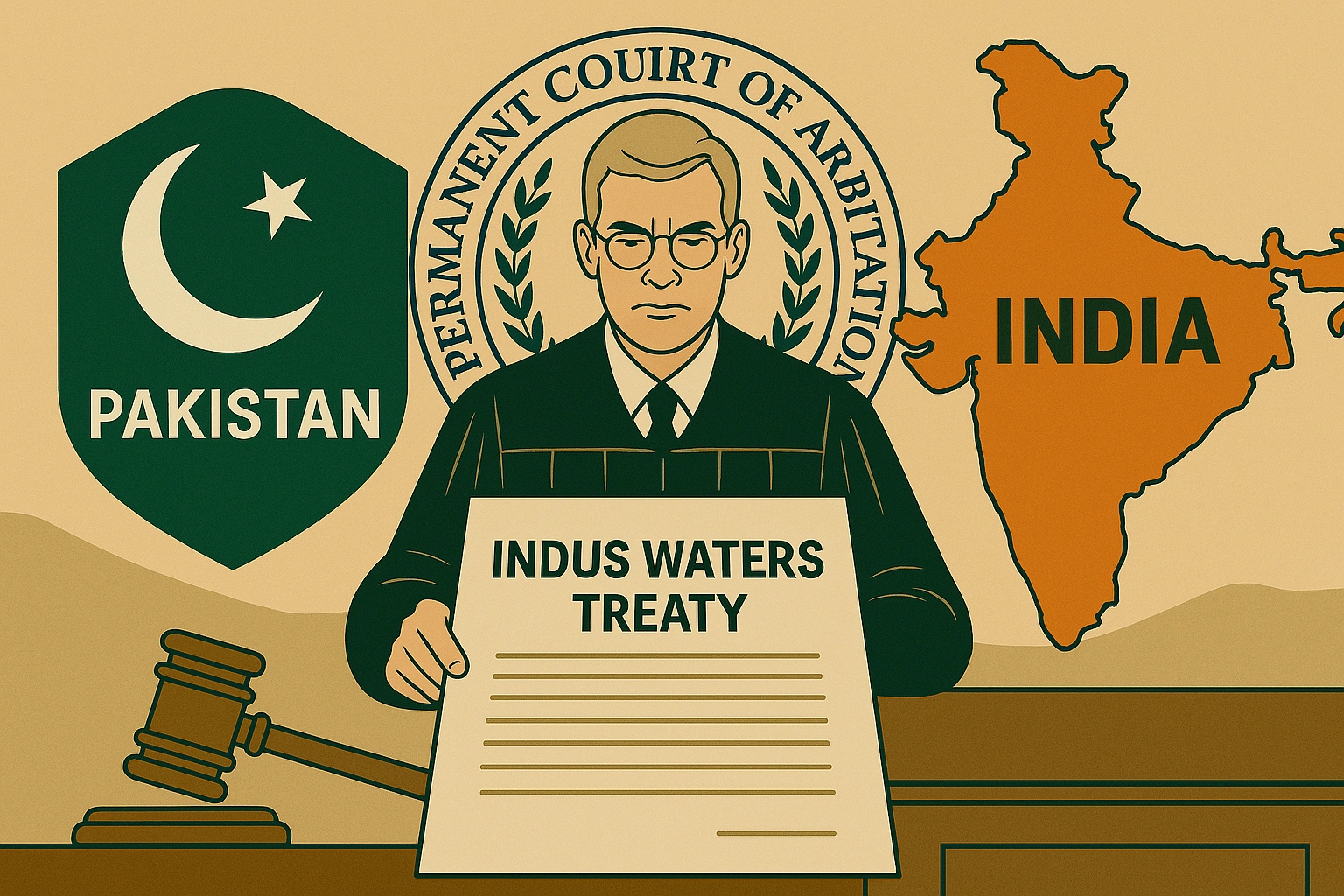The Indus Waters Treaty is Not a Tool for Political Leverage
Initial Insights
The Permanent Court of Arbitration (PCA) made a conclusive decision in favour of Pakistan on 27 June 2025. It is basically on the existing dispute with India over interpretation and implementation of the Indus Waters Treaty (IWT). The Court by consensus affirmed the jurisdiction of the PCA and the fact that the IWT remained valid. Thereby, affirming that India failed in suspending the Treaty unilaterally. Not only does this judgment reiterate the long held legal stand of Pakistan but also strengthens the composure of the international legal framework in the regulation of transboundary waters.
IWT and its legality
The Indus Waters Treaty is an international water treaty that was signed in 1960 with the help of the World Bank; it regulates the distribution of the Indus Water System between Pakistan and India. The Treaty is made up by assigning the waters of the eastern rivers (Ravi, Beas, Sutlej) to India, and the western rivers (Indus, Jhelum and Chenab) to Pakistan, with the facility of some use of each side of the waters on the other side.
The decision of the PCA clarifies that the validity of the Treaty is still binding and effective, and the move by India in April 2025 to put Treaty in abeyance was legally dissolved. The judgments emphasized that dispute settlement under Article IX is compulsory, organized, and cannot be deterred unilaterally. It is an indispensable statement of international conventions, and legal predictability and integrity of procedure must prevail over national political expedience.
The Unilateral Declaration by India and the reply of the Court
Declaring the suspension of the treaty, India was acting in conditions of increased tensions in the region. New Delhi argued that it was hostile acts on the part of Pakistan to seek relief under the PCA and the World Bank and therefore it was within its rights to cause a temporary suspension of the Treaty. But this motive was also dispassionately denied by PCA.
It is worth mentioning that in customary international law and the Vienna Convention on the Law of Treaties, a party does not have the freedom to suspend its treaty obligations and at the same time enjoy them. Moreover, India made no further cooperation in solving the disputes, but, on the other hand, went ahead with hydroelectric development works on the western rivers. Likewise, this contradiction was also observed by the Court and considered as not only legally inconsistent, but also procedurally defective.
Besides, the PCA re-confirmed that the arbitration process once commenced can neither be halted nor set aside unilaterally by any of the parties. Therefore, this is a fundamental principle by which reprehensible exercise of international law happens out of strategic machines to achieve short-term political goals.
Legal and Strategic response of Pakistan
Pakistan on the other hand has adopted a policy stance of legal continuity and sensitivity to world affairs. For this reason, in 2016, Islamabad invoked all the provisions envisaged in Article IX of the IWT when it requested India to put an end to its hydroelectric schemes on Kishanganga and Ratle rivers. In addition, Pakistan brought the dispute to arbitration and at the same time shared the World Bank, the third-party guarantor in the Treaty.
After India had declared abeyance in 2025, Pakistan not only dismissed the claim as illegal but also terminated Simla Agreement of 1972 officially, adopting a new strategy based on multilateralism. Although the Simla Agreement was a political agreement at the bilateral level, the IWT is a legal agreement with multilateral support, and it is law-binding and engraved in international laws.
In the process of abandoning the Simla framework, Pakistan was indicating a doctrinal shift to the rules-based multilateralism, where the third party adjudication system superseded the direct bilateral mechanisms. In this regard, Pakistan asserts that it is consistently abused by India over issues pertaining to water, Kashmir, trade among many others.
Saving the integrity of the IWT Mechanisms
The PCA decision highlights that such technical and environmental issues in the Treaty (like pondage, spillway design, and levels of drawdown) should still be subject of regulation by the available mechanisms. Under the IWT, the parallel procedure the Neutral Expert process is also subject to the same legal standards and can likewise never be unilaterally suspended.
This transparency will make sure that the backbone of the water sharing discussions will be scientific and engineering concerns and not political intentions. It strengthens the legal framework of the IWT by ensuring the safeguarding of the neutrality and expert-based nature of the IWT.
Wider implication of South Asia and International Law
This case established an important precedent on the levels of hydro politics and transboundary water law. It strengthens the international statute that no country can politicize or place or hold international treaties, especially over the utilization of associate natural resources. By so doing, it enhances the trust in international arbitration as a feasible channel in the mechanism of settling complex, high-stake disputes.
Further, the decision also indirectly cuts across the desire of India to place water questions within the context of contestation or strategy by reiterating the law over politics. Pakistan has been able to defend its legal position and symbolize itself as a status quo player. The player that enshrines international law and is more interested in judicial resolution than an escalation.
Existing toward a Post-Simla Regional Order?
The combinatory approach of legal claim to the IWT and strategic dissociation with Simla Agreement by Pakistan may lead to opening of a new possibility of post-Simla regional order which is multi laterally structured and where regional resolutions of disputes between states were through third parties. The normalization of diplomatic relations and stability in the region, in such a configuration, would not rely on the existing options of bilateral individualistic channels, but on universal international standards and mechanisms of enforcement.
Abandoning a solution model that has created stalemates, Islamabad has found itself again as a position holder in a larger rules-based international system that provides a model by which asymmetrical regional controversies may be resolved in terms of legal rather than military rules.
The decision of the Permanent Court of Arbitration dated 27 June 2025 proves one simple fact of international law, one of the basic instruments, treaties cannot be a means of political pressure. By substantiating the stand of Pakistan, the Court has maintained the legal integrity of the Indus Waters Treaty, continuity of technical dispute resolution and communicated the larger message against politicization of sharing of natural resources.
This landmark decision is not only a diplomatic victory of Pakistan, but also an effective statement of the rule of law in the international relations, especially in such an unstable political area which might so easily jeopardize the law. It is probable that the decision will act as a binding precedent to future conflict resolution in South Asia – and other places.








